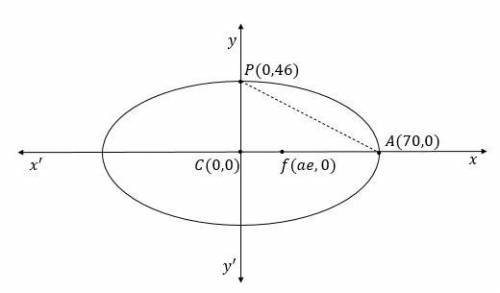
Mathematics, 10.10.2020 14:01 andy1381
The planets in our solar system do not travel in circular paths. Rather, their orbits are elliptical. The Sun is located at a focus of the ellipse.
The perihelion is the point in a planet’s orbit that is closest to the Sun. So, it is the endpoint of the major axis that is closest to the Sun.
The aphelion is the point in the planet’s orbit that is furthest from the Sun. So, it is the endpoint of the major axis that is furthest from the Sun.
The closest Mercury comes to the Sun is about 46 million miles. The farthest Mercury travels from the Sun is about 70 million miles.
1.What is the distance between the perihelion and the aphelion?
2.What is the distance from the center of Mercury’s elliptical orbit and the Sun?
3.Write the equation of the elliptical orbit of Mercury, where the major axis runs horizontally. Allow a and b to be measured in millions of miles. Use the origin as the center of the

Answers: 3
Another question on Mathematics


Mathematics, 21.06.2019 20:20
Consider the following estimates from the early 2010s of shares of income to each group. country poorest 40% next 30% richest 30% bolivia 10 25 65 chile 10 20 70 uruguay 20 30 50 1.) using the 4-point curved line drawing tool, plot the lorenz curve for bolivia. properly label your curve. 2.) using the 4-point curved line drawing tool, plot the lorenz curve for uruguay. properly label your curve.
Answers: 2

Mathematics, 21.06.2019 22:00
Acaterer charges $500 plus $30 per guest to cater a wedding. walt and traci don't want to spend more than $8000 on catering. write and solve an inequality in terms of the number of guests, g, that can be invited. a) 30g ? 8000; g ? 267 b) 500g < 8000; g < 16 c) 500 + 30g < 8000; g < 250 d) 500 + 30g ? 8000; g ? 250
Answers: 1

Mathematics, 21.06.2019 22:40
If f(x) = 3x2 - 2x+4 and g(x) = 5x + 6x - 8, find (f-g)(x).
Answers: 1
You know the right answer?
The planets in our solar system do not travel in circular paths. Rather, their orbits are elliptical...
Questions




Mathematics, 26.02.2021 14:00


German, 26.02.2021 14:00


Mathematics, 26.02.2021 14:00

Mathematics, 26.02.2021 14:00


Mathematics, 26.02.2021 14:00

English, 26.02.2021 14:00



Biology, 26.02.2021 14:00


Mathematics, 26.02.2021 14:00


Mathematics, 26.02.2021 14:00

Mathematics, 26.02.2021 14:00



 and
and  are the semi-axes of the ellipse along the x-axis and y-axis respectively.
are the semi-axes of the ellipse along the x-axis and y-axis respectively. is the semi-minor axis and
is the semi-minor axis and  is the semi-major axis.
is the semi-major axis. and
and  respectively.
respectively. million miles.
million miles. , of the elliptical path.
, of the elliptical path.
 are the semi-major axis and the eccentricity of the ellipse.
are the semi-major axis and the eccentricity of the ellipse.
 .
. million miles.
million miles.




